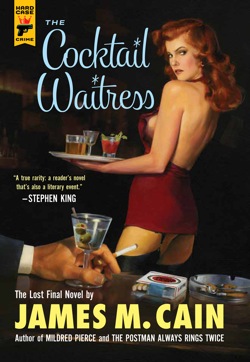 |
I finished reading THE COCKTAIL WAITRESS by James M. Cain yesterday. Cain, for those of you came in late, is one third of the holy trinity of American hard boiled crime writers comprised of himself, Dashiell Hammett and Raymond Chandler. I'll leave it up to you to determine which author represents the Father, Son and Holy Ghost. These three men plied their trade in the pages of the pulp magazines of the 1930s and '40s. They wrote some of the best crime stories of the twentieth century and many of their works have been made into classic films.
Cain had his own holy trinity of pulp fiction with THE POSTMAN ALWAYS RINGS TWICE, DOUBLE INDEMNITY and MILDRED PIERCE. All three are terrific novels and all three have been made into great films (some, more than once and in those cases, it is forever and always the original first versions which remain the best, most definitive adaptations of the source material).
Cain died in 1977 right about the time his body of work was beginning to achieve mainstream recognition and respect. Academics turned their attention to his novels and Cain achieved a measure of immortality as a purveyor of a unique brand of American literature. The majority of Cain's work, despite having roots firmly planted in the trashy soil of the pulp garden, transcended those humble beginnings and is still in print today.
Recently, a "lost" unpublished last novel of Cain's was discovered. The trouble was, this heretofore unknown novel, THE COCKTAIL WAITRESS, didn't exist in just one final form. There were multiple drafts of the work which included different sequences of events, changed names, different descriptions of key scenes, some extraneous material that didn't advance the plot, etc. It fell to editor Charles Ardai (the mastermind behind the extraordinary Hard Case Crime imprint) to shape all of this material into a readable, coherent, linear story. He explains his process in an afterword in the book and I'm here to say that Ardai performed an admirable job. When I was reading the story, I thought it flowed seamlessly. Well done Mr. Ardai. I think James M. Cain would be proud.
The story is narrated by the twenty-one-year old, recently widowed Joan Medford. The action opens at her husband's funeral. His death, she tells us, was an accident and besides, he was a louse who mistreated her and their son and deserved what he got when his car ran off the road and smashed into a culvert.
Joan is left penniless and unable to take care of her son, who goes to live with his aunt, Joan's sister-in-law, who wants to have Joan found unfit so she can keep the child for herself. Joan gets a tip from a sympathetic police officer and soon finds herself hired as a cocktail waitress in a local bar (this despite no previous experience). Joan, it is noted, has a great pair of legs and a body to go with them.
While working in the bar, she meets and serves a regular customer, an older, wealthy man named Earl K. White. Earl falls hard for Joan and she sees a way out of her predicament if she marries the rich old man. But she's also become involved with Tom, a handsome young man who has grandiose dreams of making it big and is also warm for Joan's form.
Through a series of classic Cain plot twists and turns, Joan marries Earl, then loses him when he dies under suspicious circumstances. The police are closing in and she soon finds herself under arrest for the murder of her younger lover, Tom.
However, charges are dropped when an inquest finds "insufficient evidence" against the young woman. She's free to start her life over but is she really? Here's where the brilliance of Cain comes into play. Everything we're told in this story is related to us by Joan who steadfastly maintains her innocence in the deaths of all three men (two husbands, one lover). The question is, is she a reliable narrator, someone that the reader trusts to be telling the truth? Or is she really a scheming murderess who has told her version of the story to cover up and omit certain facts and details and make herself look sympathetic and an innocent victim of misunderstandings and cruel fate? Cain leaves it up to the reader to decide the veracity of Joan's tale. Did she or didn't she?
THE COCKTAIL WAITRESS is a vintage slice of noir pie in which characters get helplessly entwined in webs of their own spinning (to mix metaphors). It's a fast read and I enjoyed the book with one minor quibble.
Cain excelled at plotting and characterization. What he wasn't so good at was dialogue. There are passages in the book that just don't sound right. Words are strung together in ways that no one would ever actually give voice to. The odd language and sentence structure is consistent throughout the book and it's slightly off putting. Also, the text could have used one more pass under the eye of a good copy editor as there are several mistakes of spelling, punctuation and grammar.
Still, a new James M. Cain novel is cause for celebration among genre aficionados. Even if we had to wait thirty-five years, THE COCKTAIL WAITRESS proves that the old master still had it. Highly recommended.
|
Tuesday, November 20, 2012
THE COCKTAIL WAITRESS
Subscribe to:
Post Comments (Atom)
No comments:
Post a Comment